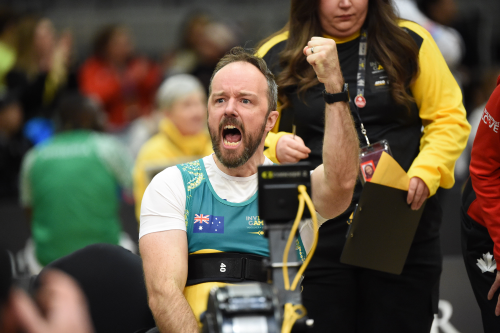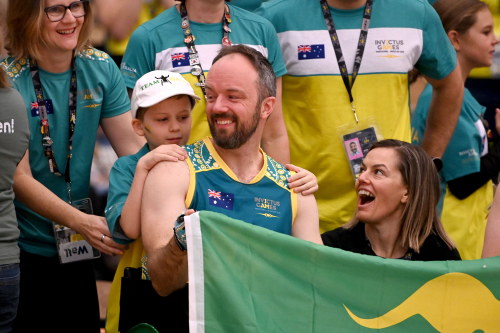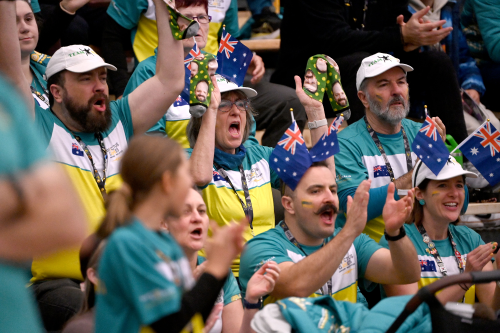Healing through sport: the Invictus Games legacy

A message from Invictus Australia
The world has witnessed the indomitable spirit of Team Australia at the Invictus Games Vancouver Whistler 2025. From 8 to 16 February, 33 current and former serving ADF personnel, alongside more than 100 of their family and friends, embarked on their Invictus journey.
With more than 500 competitors from 23 nations, it was a showcase of physical and mental strength, grit and determination, and a global display of solidarity. These competitors demonstrated the transformative power of sport in recovery, resilience and rehabilitation.
Triumph through sport: Alex Hale’s journey
For Team Australia competitor and Navy veteran Alex Hale, the games represented hope and healing, made possible by the unwavering support of his family.
A car accident changed Alex’s life forever, leaving him paralysed and facing an uncertain future. Yet, when a friend remarked, ‘We’ll turn him into an athlete!’, it ignited a spark of hope. Determined to overcome his challenges, Alex embraced the adaptive sports of wheelchair basketball and archery. Sport became a lifeline, as he rediscovered the depths of his capabilities.
‘Sport allows me to explore and test my physical limitations, build strength and stamina as a wheelchair user, and overcome the physical and mental obstacles my injury brings,’ says Alex.
For Alex, the Games were about more than just competition, they were about reclaiming identity, building resilience, and connecting with others facing similar challenges. Through sport, he found purpose and community, proving that the human spirit can triumph in the face of adversity.
‘Winning for me is continuing to get stronger and more capable,’ says Alex. 'The Invictus Games gave me the courage to push my limits and the confidence to believe in myself again.’
Alex’s journey was fuelled by an unconquerable spirit plus the support of his wife, Erin, who became his full-time carer, and his son Max, who inspired him daily: ‘Erin and Max were leading my cheer squad, supported by the rest of my family!’

The healing power of sport
Research from the Beyond the Finish Line study by the Invictus Games Foundation shows that adaptive sport enhances psychological health, increases confidence, and reduces anxiety and depression.
According to Behavioural Scientist Celina Shirazipour, who spearheaded the research, the findings, which are the culmination of 5-years of research across Invictus Games nations, demonstrate the power of sport for recovery. ‘Notably, it showed us that a quality military adaptive sport experience doesn’t just improve health but can act as a catalyst for personal growth outside of sport, helping competitors to develop life skills,’ Celina said.
Veteran Family Advocate Commissioner Gwen Cherne, who attended the Invictus Games, echoed this sentiment, saying that sport is more than physical activity – it’s a vehicle for connection and recovery.
‘Sport helps veterans and their families build resilience and find a sense of belonging,’ Gwen said. ‘Behind every serving member or veteran is a family that serves alongside them. Their support provides strength, hope and motivation during the toughest times, and is critical in rehabilitation.’
Led by Co-Captains Doug Griffiths and Kaz Gladysz, Team Australia celebrated resilience and recovery. Although medals were won, the true inspiration lay in the unconquerable spirit of the competitors. Their achievements, from first-time experiences on snow to personal bests, were made possible by the unwavering support networks standing behind them.

A legacy of recovery and hope
Beyond the games, Invictus Australia continues to foster community spirit and highlight the power of sport in recovery and connection.
While 33 competitors represented Australia on the global stage, Invictus Australia’s Local Veteran Engagement Managers connected with almost 500 veterans and family members in February. This is in addition to the almost 7,000 veterans and families who attended sporting activities with Invictus Australia last year alone, with the impact only likely to increase.
The Invictus Games celebrated courage, recovery, and the power of sport to transform lives. They reminded us that recovery is a team effort. Behind every competitor is a family, a community and a nation that stands with them.
For Alex Hale, staying connected with his community was essential to his recovery and will remain a priority beyond the games. Alex says the experience was about personal triumph and powerful moments of connection as he competed alongside others who understood his journey. He found strength and motivation, and remains determined to inspire others.
‘The Games showed me that my story isn’t over. It’s just the beginning of a new chapter.’
Invictus Australia remains committed to supporting veterans and their families beyond the Games, ensuring they have the connections and opportunities they need to thrive. In the words of William Ernest Henley (Invictus: 1875): ‘I AM the master of my fate, I AM the captain of my soul’.
Images:
Alex Hale likes his time in the Indoor Rowing.
Alex Hale with his biggest fans
The 'Alex Hale Support Crew' at the Invictus Games